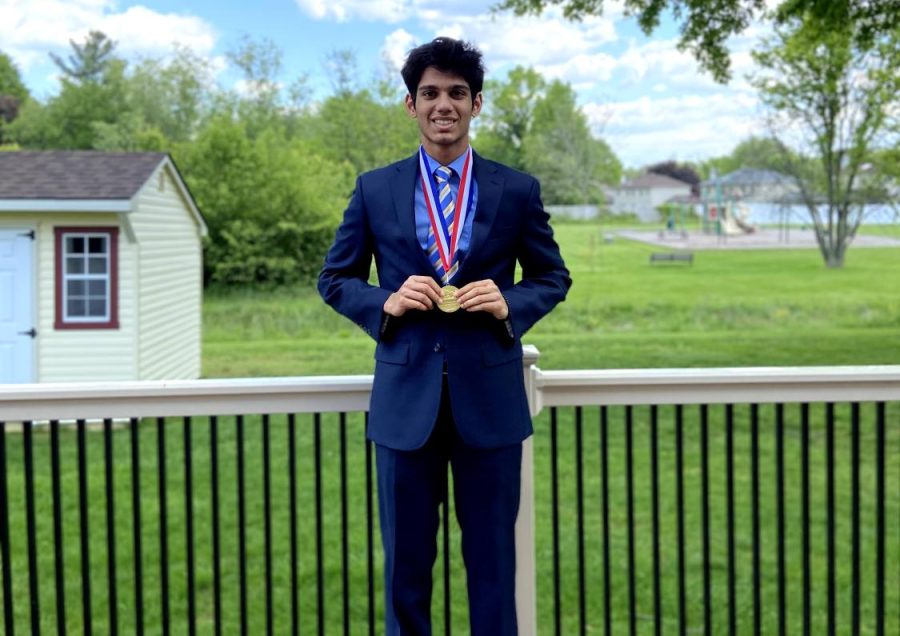Yash Prabhu celebrating victory after publication of research paper
Yash Prabhu poses proudly with his medal.
From taking home gold in the Delaware Valley Science Fair competition his sophomore year to having one of his most time-consuming and difficult research papers rejected at a regional competition Yash Prabhu turns his failure into a success story.
Yash Prabhu starts the school year strong with one of his research papers being published at a conference called IEEE. IEEE is an organization dedicated to assisting humanity through enhancing technology. The organization sponsors over 2,000 events yearly and organizes top-tier conferences with published papers being recognized by academia and industries. Prabhu recently had a paper published called “A CNN Based Automated Stuttering Identification System”, where he uses machine learning to detect different types of stuttering in audio segments.
“Stuttering affects a lot of people around the world and it’s a surprisingly ignored issue. Some people who stutter receive speech therapy but a lot of people don’t. Stuttering can damage the quality of life for people. It makes it harder to speak and harder to interact with people. You could get bullied, teachers could get frustrated speaking to you [and] it gets worse when you’re older because you have to give meetings and presentations,” explained senior Yash Prabhu.
The goal for his research paper revolves around his wish to make low-cost automation available to people worldwide, mainly in developing countries such as India where resources are scarce.
“I am trying to design a model that can classify stuttering. By classifying stuttering it can help keep data. In an area where there’s a lack of speech pathologists like in India, this model can have a big impact by keeping diagnostics on stuttering and also helping speech pathologists do a better and faster job so they can treat more people,” Prabhu said.
The model Prabhu used is called a machine learning model. Machine learning creates functions to help make predictions.
“I found a data set provided by Apple called SEP-28k and this data set [consists] of many examples of stuttering. I chose 5 different speech disfluencies and I trained my model to detect the speech disfluencies,” Prabhu added.
Prabhu took the initiative to explore a data set that had not been extensively researched leading to hardships.
“I emailed professors, I called doctors, I asked for access to data sets. Nothing really [worked] out because it was hard to find someone who could help me get access to data. A lot of doctors and professors are busy, they don’t have time to talk to you,” Prabhu said disappointed.
Nonetheless, his chances of success improved when Dr. Naeem Seliya, a professor at the University of Wisconsin Eau Claire, agreed to assist him.
“I emailed him my credentials and asked him if I could work with him. He is actually a stutterer and he told me about a device he uses for stuttering. From there this idea was born in my mind. I can use my machine learning skills to have an impact in this area. At that point, I had no clue how to do it. I had absolutely no clue, I just knew I wanted to. For months I did research. I tried finding different ways to do it, but I failed a lot of times,” Prabhu explained.
The difficulties he encountered while working with audio data resulted in poor models that produced faulty results.
“When I submitted this to the local science fair it didn’t go through which was a disappointment. I thought this was the most difficult project I have ever done to this day,” Prabhu said disheartened.
He reflected back on his Sophomore year, where he designed a Covid-19 screener using machine learning and hardware. The project was inspired by the pandemic and received gold at the Delaware Valley Science Fair. However, his recent paper was rejected by the local science fair.
“Being rejected by the local science fair was a big bruise…but I think it was a blessing in disguise because I got to make this whole paper. This paper was born from the science fair project failing. I made my models better, I trained them with more data, [and] I ended up submitting them to the conference,” Prabhu added.
In the future, Prabhu plans to attend a four year university and continue doing research while immersing himself in robotics, engineering, and programming.



Tamim Sarwardi • Oct 26, 2022 at 10:31 am
He’s pretty smart.
Kathleen McGill • Sep 30, 2022 at 11:56 am
This is impressive